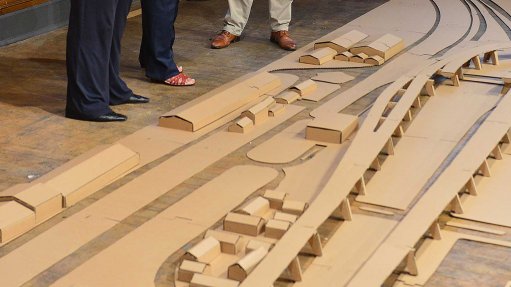
More than 600 engineering students from the University of Cape Town (UCT) have come up with suggestions for what do with the city's infamous unfinished Foreshore freeway, together with the Foreshore precinct.
They range from demolishing the unfinished freeway to free up land for vibrant social housing to creating well-planned public spaces.
The challenge posed to students was to think differently about the Foreshore on the foot of Cape Town’s central business district.
“Could the freeway be significantly changed or demolished and replaced with vibrant social housing, bustling markets, seafront restaurants and cafes and well planned public spaces?” questioned UCT's Dean of Engineering and the Built Environment, Professor Francis Petersen.
Ideas, on show at the Cape Town City Hall, ranged from the outlandish to the very practical, including the design for a rollercoaster with two arms that stopped mid-air and that could regularly be used for film and fashion shoots. Other ideas involved creating skateboard parks, gardens and farming projects, as well as reconnecting the city with the sea through canals.
“We have been very excited about this collaboration. We placed no limitations, as we want to fully tap into the creativity and open minds of the students,” said Brett Herron, a member of the city’s mayoral committee for transport.
The proposals, which formed part of the World Design Capital 2014 project, stemmed from a collaboration between UCT, the City of Cape Town and the city’s transport authority, ‘Transport for Cape Town’. Developing innovative proposals for the future of the city’s foreshore were integrated into the academic curriculum for students over the course of last year.
The undergraduate and postgraduate students had been drawn from the departments of architecture, urban planning, landscape architecture, urban design, property studies, quantity surveying and civil, electrical and chemical engineering.
“It is increasingly recognised that innovation and creativity work best when people from different disciplines come together to brainstorm about real-world problems,” said Petersen.
The students had looked at successful examples from other cities around the world, while taking into consideration the needs and priorities of people living in Cape Town.
The Future Foreshore projects would be exhibited at Cape Town’s City Hall until April 25 and would be evaluated and adjudicated by a team of professionals from across a number of disciplines. Capetonians had also been urged to have their say on the projects, as the team would also consider their views.
“We could easily have put a tender out into the market and awarded a contract for a conceptual framework for the Foreshore. But we have not chosen the usual route. We were looking to be excited by bold thinking, creative energy and unfettered concepts that are aligned with the economic, mobility and social realities that we grapple with every day,” said Herron.
Depending on the outcome of the adjudication and further engagement with UCT and the students, concepts may be developed further.
“The Foreshore is no doubt the most significant precinct in our city centre, which, if treated correctly, has the potential to unlock enormous opportunities for the entire city and all of us who live here,” said Herron.